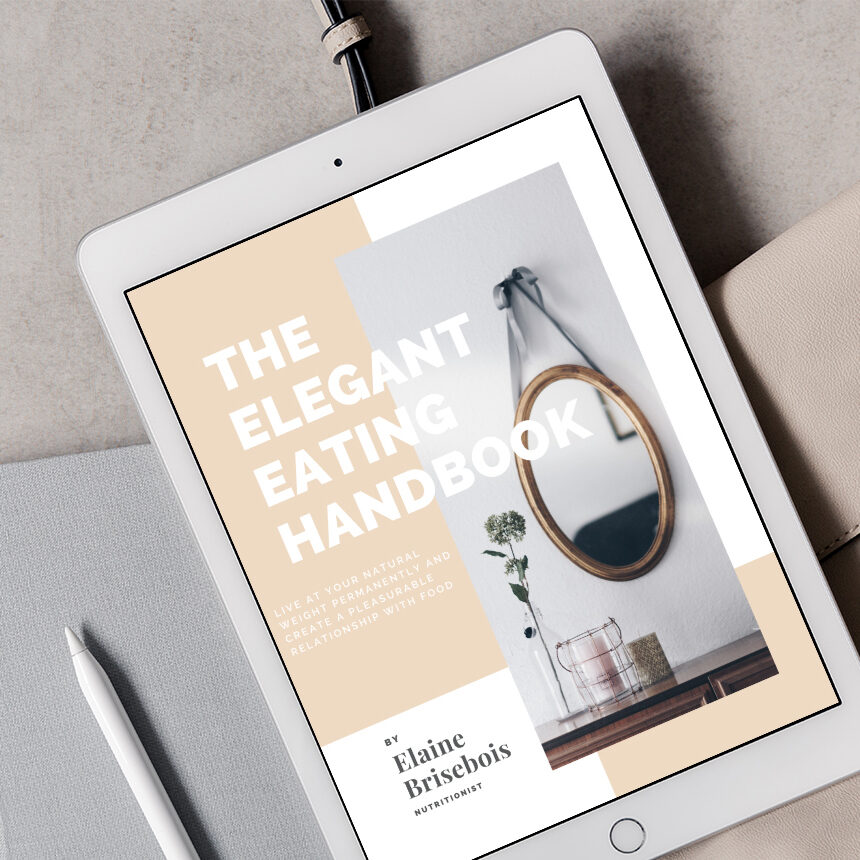Today I’m re-visiting a topic that I’ve discussed here on the blog before, but I want to shed more light on the subject, or perhaps a new perspective.
And that’s on keeping a food journal!
A food journal can be a powerful tool if you keep it simple and do it in a supportive and loving way.
I know it’s something that so many people resist doing (I was definitely one of them), and I believe there is a good reason for that, which is something I want to address today, including how you can actually overcome that resistance.
And I will say, my clients who honestly and accurately track their food intake, almost always get the best results, which also includes cultivating a healthier relationship with food in general.
When done correctly, it provides a valuable opportunity to overcome some of the most common obstacles that hold people back when changing their eating habits.
Overcomplicating it is one of the main reasons, I believe, why there’s sometimes so much resistance around it.
I always suggest keeping it super simple.
So, for example, if I were to track my dinner from last night, I would say:
- 1 baked chicken breast stuffed with some ricotta cheese, alongside roasted red peppers and sautéed rapini.
Including an estimate portion size is helpful to start, but not necessary as you start to get more in tune with the quantities that serve your body best.
I know some people love their various tracking apps (i.e. My Fitness Pal), and if that works for you, that’s fine, but I generally recommend my clients use a very straightforward method of tracking as per above.
Otherwise, there’s a risk of getting too caught up in the numbers (i.e. calories, grams of carbs, exact serving size). Then they either end up overly focused on the nutrient breakdown (sometimes avoiding health-supporting foods unnecessarily), or it just becomes too tedious a task to track, and they eventually stop doing it.
So I think that’s the first step in overcoming resistance is keeping it really simple.
This leads me into benefit number one for keeping a food journal…
—
1. Overcome perfectionism and “all-or-nothing” thinking.
So this is another reason why I think so many people resist keeping a food journal. We’re okay with tracking our food, but only as long as we’re doing it perfectly.
I can definitely relate here. Maybe you can too?
I remember in earlier times, I could keep a food journal at most for maybe 2 or 3 days…then by day 4, I would eat something that I had deemed “not so great,” and it was like I had ruined my good streak. So I would scratch that and have to start over again until my perfect streak ran out once more….again, this was typically a few short days later.
I didn’t want to track the “slip-ups” or the times I overate and used it as an excuse to spiral out of control with the remainder of the day. Instead, I would just start fresh again the next day, so I didn’t have to have the evidence of my “imperfect” eating documented.
If I didn’t write it down, then it didn’t really happen (or so I convinced myself).
But this all-or-nothing mindset never led me to long-term or sustainable success because I was constantly throwing in the towel and starting over again.
For my clients who struggle with this themselves, keeping a food journal provides an opportunity to overcome that need to be perfect, because really, it’s pretty much impossible to be “perfect” for 3 + months straight (3 months is the length of my program, but some go on to work with me longer).
Obviously, this time frame provides a lot of opportunity for “imperfect eating.”
This is great because that means there are also many opportunities to practice “not throwing in the towel” and just getting on with things without making them a big deal.
Plus having clients track their food (“imperfect” eating and all) gives us a more complete overview of their total consumption in terms of weeks and months – not just a few random days here and there.
It’s not uncommon for a client to express disappointment about “messing up” or “blowing things.” It might be because they had a few unexpected treats or perhaps a day of eating (or two) they were unhappy about.
But interestingly, often upon further investigation, usually when I’m reviewing their whole week, it’s like no, the majority of their eating was on point, and they even went down a pound or two!
This is to say that a few “off” meals or days really won’t break (or make) your diet over the long run. That’s why focusing on what you do consistently 80% of the time, for example, is more important than focusing too heavily on what you do inconsistently the other 20% of the time.
When you have it all written out and you’ve been honest with your tracking, you provide yourself with the evidence that perfection isn’t required to get results.
—-
2. Build awareness
We tend to have a short memory when it comes to our eating habits.
We often underestimate all of those extra bites and “grabs,” almost as if they don’t count. But if you start honestly tracking EVERYTHING, you might start to think twice about those little extras, because you know you’ll need to write it down.
I see this with clients, particularly in the beginning, that when they’re tracking their food, there are fewer little grabs and bites between meals.
Maybe they start eating at main meals only, and when they do eat between meals, they’re much more intentional about it. They may still have a snack here and there, but it’s much more deliberate, as opposed to sneaking a handful of chips or some crackers as they walk past the pantry.
So definitely, there is more awareness there with all those mindless extra bites throughout the day.
Of course, another benefit of tracking your intake is that you start to become more aware of how certain foods affect you physically/mentally/emotionally – whether it be your digestion, energy levels, or even your mood.
There might be times when things are really smooth sailing, and you’re making progress, and then all of a sudden, something happens.
Maybe there’s an upsetting event, or you have a particularly stressful week of work. You might find yourself slipping back into familiar habits. Perhaps you notice that you have more urges to reach for the food (or alcohol) to cope or find relief.
The good news is, when you’re capturing this all in your food journal, you can often catch yourself before regressing too far. You can get curious about what might be going on for you.
You might even start to notice some familiar patterns with your eating habits when you’re particularly stressed, for example, that you can “get out ahead of”.
By increasing your awareness, you can start to pinpoint the thoughts and feelings that are driving those actions, and put the work in there, rather than focusing so much on “not reaching for the food” (i.e. again, getting out ahead of it before it happens).
—
3. Increase self-love
Again, too often, people get hung up on the few “bad” choices rather than focusing on the progress they’ve made.
In keeping a food journal you have the evidence of all the nourishing food you provided yourself. Maybe you can see that you’re getting better with tuning into your hunger and stopping eating when you’re full. Or perhaps you see that you’ve significantly reduced your evening emotional eating.
You can celebrate the wins and show yourself some love for all of the positive changes you’ve been making. Too often, we skip this part and fail to honor the smaller successes along the way – even if that’s just drinking more water, or having a day when you stuck with what you planned.
And on those days when things didn’t go as you planned? You can investigate in a loving and supportive way, rather than judging or getting down on yourself for it.
Because that’s what we do, right?
We judge ourselves harshly, and there’s all this negative self-talk. And now, there’s this compound effect – not only are we disappointed about the food choice, but now we’ve layered all of this drama and negativity on top of it.
This is why it’s so important to take the moral value out of your food choices and not make it mean that you’re a terrible person who has no discipline or willpower if you happen to eat something “less than ideal.”
Rather than think in terms of “good” or “bad” foods, think about how you can fuel and nourish your body in a way that’s loving and supportive to your long-term goals.
Sure, there are undeniably healthier and less healthy choices (although even those are debatable depending on who you ask), and not every food has to get a participation ribbon.
But overall, are your food choices helping or hindering you?
Are they moving you closer to your desired results, or further away?
If not, then get curious. Ask yourself, why not?
Then go about answering that question for yourself.
Love yourself enough not to just sweep it under the rug because you’re afraid to look at it or feel the discomfort, but be sure to check any judgements and negativity at the door while doing so.
There you have it!
A food journal can be a powerful tool if you keep it simple and do it in a supportive and loving way.
I would love to hear from you! Let me know in the comments below if you keep a food journal – and if so, what benefits have you experienced?
Ready to permanently lose weight, stop overeating, and uplevel your relationship with food?
Learn more about my private 1:1 program here.
Download a copy of my Elegant Eating Handbook to learn simple and effective strategies for permanently living at your natural weight.

Hi! I’m Elaine, a Certified Nutritionist & Master Health Coach. I teach women how to lose weight while prioritizing the health of their bodies and minds (while also enjoying the foods they love!).

Get a free copy of my handbook!
The Elegant Eating Handbook: Simple and Effective Strategies for Lasting Weight Loss and a Peaceful Relationship with Food.
share with friends
keep reading...





[…] a food journal to hold yourself accountable, and maybe noting how certain foods affect your digestion and […]